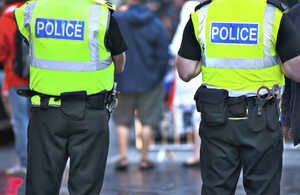New protest laws on face coverings and pyrotechnics
Police will be given powers to arrest protesters who wear face coverings to threaten others and avoid prosecution, and pyrotechnics will be banned at protests.

Photo: Getty Images
The new laws will crack down on dangerous disorder, following warnings from police chiefs that some protesters are using face coverings to conceal their identities, not only to intimidate the law-abiding majority, but also to avoid criminal convictions.
Whilst police already have powers to ask individuals to remove these at designated protests, where police believe criminality is likely to occur, this new offence will empower officers to arrest individuals who disregard their orders, with those who flout the rules facing a month behind bars and a £1,000 fine.
Flares and other pyrotechnics will also be banned from protests, and protesters will no longer be able to cite the right to protest as a reasonable excuse to get away with disruptive offences, such as blocking roads.
Flares and other pyrotechnics have been used during recent large scale protests, including being fired at police officers, posing significant risk of injury. The new offence will make the possession of flares, fireworks and any other pyrotechnics at public processions and assemblies for protest illegal. Perpetrators may be forced to pay a £1,000 fine.
The measures, which will be introduced in the Criminal Justice Bill, will also make climbing on war memorials a specific public order offence, carrying a 3 month sentence and a £1,000 fine. This comes after recent incidents where individuals have broken away from large protests and scaled national monuments, demonstrating brazen disrespect to those who have given their lives for this country.
Alongside the new offences, the ability to use the right to protest as a reasonable or lawful excuse to commit some crimes would also be removed, ensuring that protest is not used as a defence for criminality such as obstructing public highways, locking on, as well as public nuisance.
Home Secretary James Cleverly said:
Recent protests have seen a small minority dedicated to causing damage and intimidating the law-abiding majority.
The right to protest is paramount in our county, but taking flares to marches to cause damage and disruption is not protest, it is dangerous.
That is why we are giving police the powers to prevent any of this criminality on our streets.
National Police Chiefs’ Council Lead for Public Order, Chief Constable BJ Harrington said:
We welcome the proposal to create new offences relating to war memorials and flares, as well as making it clear that covering your face at a protest to conceal identity is not acceptable.
These changes are in line with conversations that we have had with the Home Office to ensure that we have the powers that we need to get balance right between the rights of those who wish to protest, and those impacted by them.
Thankfully, the use of flares and pyrotechnics at public order events is rare, but they are still extremely dangerous. Safety is our number one concern when policing these events, and the effective banning of these items during protests can only help in our mission to ensure that they take place without anyone coming to any harm.
As with all policing powers, these new powers will be used when appropriate, proportionate, and necessary to achieve policing objectives.
Policing is not anti-protest, but there is a difference between protest and criminal activism, and we are committed to responding quickly and effectively to activists who deliberately disrupt people’s lives with reckless and criminal acts.
The College of Policing’s Chief Constable, Andy Marsh, said:
I welcome the new offences this legislation will provide the officers who are policing protests and working hard, in complex environments, to keep people safe.
The safety of both those protesting and others nearby trying to go about their business is the top priority and our training and guidance focuses on balancing the rights of those protesting with the rights of those affected. The new legislation is now clear that protest is not an excuse for serious disruption.
As with previous changes the College of Policing will work quickly to provide practical advice, training and support for policing to utilise these new powers.
Speaking to police chiefs at a roundtable on Tuesday (6 February), the Home Secretary thanked the police for the efforts and successes they have made in keeping the public safe during recent protests.
Since 7 October 2023, there have been more than 1,000 protests and vigils, with more than 26,000 police officer shifts between 7 October and 17 December alone, and 600 arrests.
The Home Secretary called on chiefs to continue to use all the powers at their disposal to maintain order as they meet the evolving challenges.
The measures announced today (8 February 2024) are part of the government’s ongoing crack down on disruptive protest and follow legislation passed last year which criminalises actions such as ‘locking on’ and given police the ability to stop and search protesters for items such as padlocks and superglue, if they suspect they are setting out to cause chaos.
The Police, Crime, Sentencing and Courts Act 2022 also made it easier to tackle public nuisance caused by protesters. The government is working positively with the police to ensure the powers they have to maintain order are effective and that practical and workable solutions are developed in response to any gaps that are identified within the existing legal framework.
During the most recent Just Stop Oil campaign, police figures show that 657 protesters were arrested in 2023 under the government’s Public Order Act 2023, showing that existing powers are effective in managing disruptive protests.
The measures will be introduced as amendments at the report stage of the Criminal Justice Bill in the House of Commons and will apply to England and Wales.